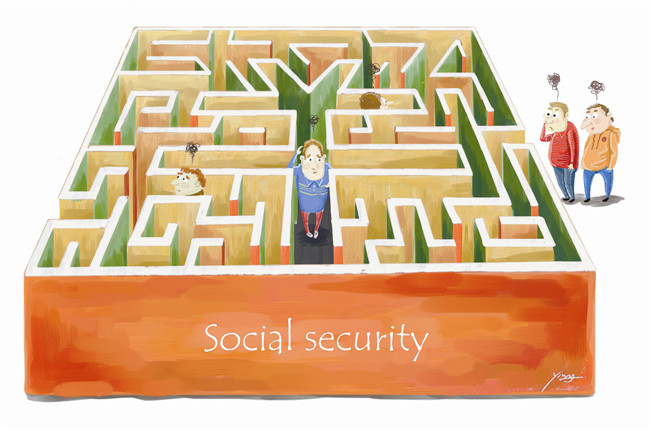 |
| Wang Xiaoying/ China Daily |
Elsa Jacquin has a social insurance card issued by the Chinese government, but the French expatriate is not sure if she is covered by the country's social security network, and doesn't know where to seek an answer to this and many other questions.

"How should I draw my pension? Where should I go when I relocate to other cities in China? How can I access unemployment or maternity benefits?" she asked, adding that many of her friends are just as confused.
Jacquin paid social insurance contributions via her former employer when she lived in Beijing, but canceled the payments when she moved to Chong-qing in 2012.
She now runs a consultancy and is hoping to enroll her foreign employees in the program, but doesn't know where to seek help.
In 2011, the Ministry of Human Resources and Social Security issued a regulation stipulating that all foreigners working in China should be included in the social security system from October that year.
However, a lack of efficiency and clarity in implementation means many foreign workers are hesitant about joining the program.
According to the ministry, just 33 percent of the 600,000 foreigners working in China last year had joined the program by 2013.
"The participation rate of those from overseas is small compared with the number of expats in China," Hu Xiaoyi, vice-minister of human resources and social security, told a news conference in December.
Lu Quan, an associate professor at Renmin University of China who specializes in social insurance, said inefficiency and the opaque nature of regulatory details are deterring greater participation by foreigners.
"Although China's economy has developed aggressively, services such as pensions still lag behind. Many expats return to their home countries when they retire and then find it extremely difficult to collect their pensions," he said.
In addition, he pointed out that medical bills incurred outside China are not covered by the insurance system, reducing its appeal to those who travel frequently.
Expats with valid work permits who enroll in China's social insurance program are eligible to receive benefits in five categories - medical, retirement, work injury, unemployment and maternity - just like their Chinese counterparts.
Employees pay about 10 percent of their total monthly income to the program, while their employers contribute 33 to 40 percent of the monthly contribution.
Confusingly, though, the regulations and implementation, including monthly deductions, vary from place to place according to the priorities of the local government.
In Beijing, for example, a foreigner earning a monthly salary of more than 15,669 yuan ($2,590), pays 1,286 yuan a month, while their employer pays 5,610 yuan. However, in Chongqing, an expat on a monthly wage of more than 11,349 yuan pays 1,137 yuan and the employer pays 3,745 yuan to 4,549 yuan.
 |
 |
 |
